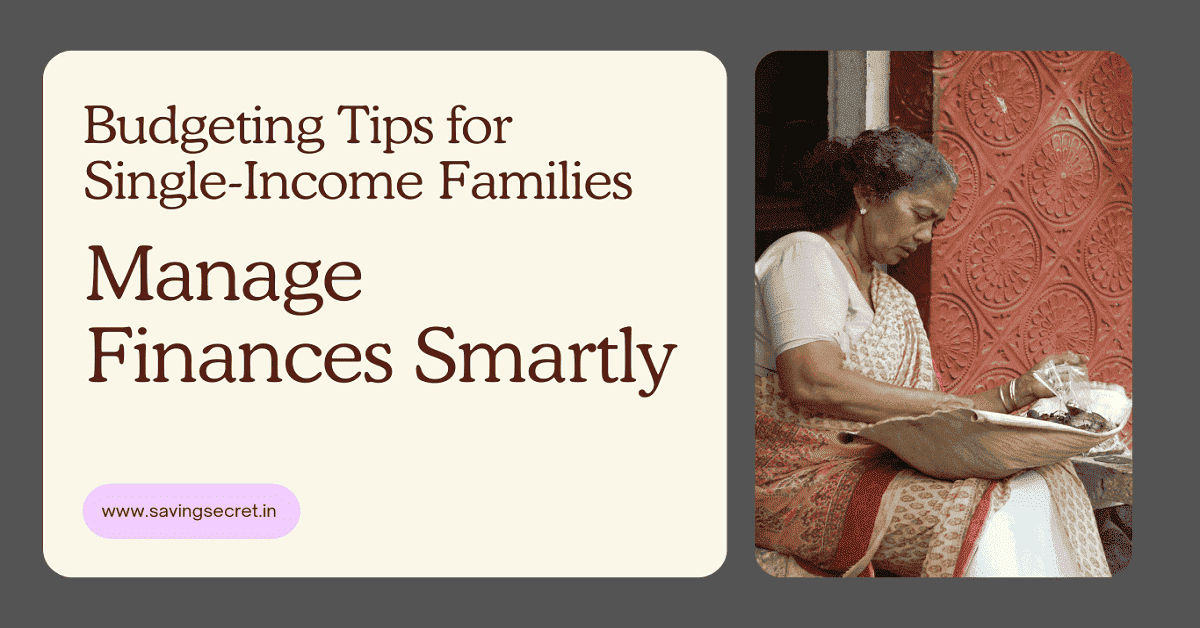Budgeting Tips for Single-Income Families: Single-income living can be difficult, but with the correct budgeting techniques, you can become financially stable, less stressed, and even start saving for the future. Whether you choose to live as a one-income family or as a single parent, prudent financial planning is crucial to paying bills, preventing debt, and establishing financial stability.

In order to help you maximise your income, eliminate wasteful spending, and prepare for a better future, this article offers helpful budgeting advice specifically designed for single-income families.
1. Monitor Your Earnings and Outlays
Understanding where your money is going is the first step to creating an efficient budget. Monitoring your earnings and outlays enables you to see trends in your expenditure, eliminate waste, and make prudent financial decisions.
How to Monitor Spending:
✔ Use Budgeting programs: To keep tabs on your expenditures, use programs like Mint, YNAB, or Good budget.
✔ Keep a spreadsheet in which you may classify spending and list sources of revenue.
✔ Review bank statements and keep receipts to identify wasteful spending.
✔ Employ the Envelope System: Divide money among many categories to keep spending under control.
📌 Advice: Determine where you can limit spending, including eating out, subscriptions, or impulsive buys.
2. Establish a Budget That Is Reasonable
Savings and spending must be balanced, and this requires a carefully thought-out budget. For efficient revenue allocation, apply the 50/30/20 rule:
✔ Rent, food, utilities, insurance, and transportation make up 50% of needs.
✔ 30% Wants: shopping, entertainment, and eating out.
✔ 20% Savings and Debt Repayment: Loan payments, investments, and emergency fund.
✔ Adjust for Special Needs: If necessary, change percentages according to day care costs, medical costs, or other need.
📌 Advice: Modify percentages according to your priorities. Reduce wants if conserving money is more important.
3. Establish an Emergency Fund
In the event of an unforeseen bill, medical emergency, or job loss, financial stability is guaranteed by an emergency fund.

✔ Try to save three to six months’ worth of living costs.
✔ Set up automatic transfers to a high-yield savings account in order to automate savings.
✔ Reduce wasteful expenditure by rerouting funds from non-essential purchases.
✔ Make Use of Windfalls Sensibly: Bonuses or tax refunds have to be allocated to the emergency fund initially.
📌 Advice: Begin modestly; even ₹500 to ₹1000 a month can build up to a substantial safety net.
4. Cut Down and Handle Debt Sensibly
On a single income, debt can be crippling, but you can manage it with careful preparation.
✔ Give High-Interest Debt Priority: Pay off personal loans, payday loans, and credit card debt first.
✔ Apply the Debt Snowball Method: To become motivated, pay off modest bills initially.
✔ Reduce Interest Rates: Speak with lenders to arrange better terms for repayment.
✔ Steer clear of new debt: Only take out loans when absolutely need.
✔ Take into account debt consolidation: combining many high-interest loans into a single, lower-interest loan can make payments easier.
📌 Advice: To make payments easier, try to combine loans into a personal loan with a reduced interest rate.
5. Reduce Needless Spending
Cutting back on frivolous expenses frees up funds for savings and necessities.
✔ Cancel unused subscriptions, including publications, gym memberships, and streaming services.
✔ Cooking at home reduces the cost of eating out.
✔ Shop wisely by using cashback applications, discount codes, and large purchases.
✔ Reduce Impulse Purchases: Give yourself a full day before making any unnecessary purchases.
✔ Use a No-Spend Challenge: Make an effort to avoid needless spending for a week or a month.
📌 Advice: Even little saves add up! Saving ₹1000 a month adds up to ₹12,000 annually.
6. Raise Your Income
Even modest wage increases can reduce financial strain and open up additional options for investments and savings.

✔ Side gigs & Freelancing: Consider blogging, e-commerce, teaching, or internet employment.
✔ Sell Unused Items: Get additional money while decluttering.
✔ Take advantage of cashback and rewards programs to make money as you spend.
✔ Ask for a rise or look for better-paying employment options in order to negotiate salary increases.
✔ Invest in abilities: Better employment prospects may result from completing a quick online course to upgrade your abilities.
📌 Advice: Even a small monthly increase of ₹5,000 can have a big impact on financial security.
Frequently Asked Questions (FAQ)
1. How can someone with only one source of income save money?
✅ Monitor spending, create a budget, lower debt, and boost savings by adopting wise spending practices.
2. What is the recommended monthly savings amount?
✅ Set aside at least 20% of your salary for savings, or start small and work your way up.
3. How should unforeseen costs be handled?
✅ Keep an emergency fund that can cover three to six months’ worth of costs.
4. If I just have one source of income, should I invest?
✅ Indeed! To increase wealth over time, start with low-risk investments like PPF, SIPs, or fixed deposits.
5. How can I maintain my motivation to keep to my spending plan?
✅ Establish financial objectives, monitor your success, and budget for modest rewards.
6. What are the most common errors made by households with only one source of income?
✅ Overspending on non-essentials, not saving for emergencies, and not making future plans.
7. How can I save money on groceries?
✅ Plan your meals, buy in bulk, use coupons, and refrain from making impulsive purchases.
8. Do households with only one income need life insurance?
✅ Yes, in the event of your death, life insurance provides your dependents with financial stability.
9. What are some strategies for reducing utility costs?
✅ Reduce water waste, turn off unnecessary electronics, and use energy-efficient equipment.
10. Is it possible to have fun on a tight budget?
✅ Of course! Use travel discounts and cashback offers, create a fun budget, and look for free activities.
Conclusion: Use Wise Budgeting to Achieve Financial Stability
Planning, discipline, and frugal expenditure are necessary for running a single-income home. You may build a stable financial future by keeping track of your spending, eliminating wasteful spending, conserving more money, and searching for other sources of income.
💡 Take charge of your finances by creating a budget now!
Budgeting vs Forecasting: Unlocking Financial Clarity & Control
Emergency Budget Planning for Indian Families: A Complete Guide
Tips for Reducing Monthly Utility Bills in India
Budgeting for Irregular Income: A Practical Guide

